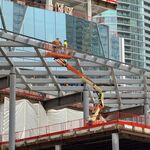Toronto closer to getting safe injection site
September 30, 2011
Comments on this story (0)
Megan Ogilvie
Toronto is one step closer to having a supervised drug consumption site now that the country’s highest court has ruled Vancouver’s controversial Insite clinic can stay open.
Public health experts, health-care workers and harm reduction activists have long said Toronto could benefit from staffed medical clinics where addicts can inject or use illegal drugs, such as cocaine and heroin.
Friday’s landmark ruling, which orders the Harper government to grant Insite exemption from federal drug laws, has removed one of the main obstacles that prevent such clinics from opening in Toronto.
But those calling for safer consumption sites worry provincial and municipal politicians will continue to rely on ideology rather than evidence in their decisions about funding such clinics.
Zoe Dodd, a hepatitis C worker in Toronto, said the city desperately needs safer consumption sites to curb the spread of disease and avert unnecessary deaths.
“We’ve lost an incredible amount of people in the community due to overdose deaths,” said Dodd, also a member of the steering committee for Aids Action Now. “If we had them (safer consumption sites) here, these people (might) still be with us today.”
Dodd and 20 other harm reduction activists met at a local health centre Friday morning to wait for the Supreme Court of Canada decision. Though they cheered after learning the court ruled in favour of Insite, some voiced concerns about whether there was the political will to tackle the issue in Toronto.
“It’s really scary right now,” Dodd said. “Politicians seem to be so willing to let ideology trump the evidence.”
A long-expected study on whether Toronto could benefit from supervised consumption sites is expected to be released later this fall — 18 months after researchers, who have remained tight-lipped, first said it would be complete.
The Toronto and Ottawa Supervised Consumption Assessment, which was approved by Toronto council in 2005, is investigating whether Toronto needs such sites, and whether a site should be fixed or mobile, single or multiple, stand-alone or integrated into other facilities.
The study has been controversial, sparking heated debates in city communities and at Toronto City Council.
Mayor Rob Ford has said he does not support supervised consumption sites as a form of drug treatment.
“I've always been opposed to those,” Ford told reporters on April 15. “I’ve never been in favour of safe injection sites.”
But preliminary research, released in April at a Toronto HIV conference, found community members and other groups were not overwhelmingly opposed to supervised consumption sites if the goal was to reduce disease and get drug use off city streets.
In April, Vancouver Mayor Gregor Robertson told the Star Insite is a crucial health-care facility for his city because it saves lives, reduces crime and saves tax dollars otherwise funneled to emergency rooms, policing and jails. Robertson warned Toronto politicians against letting political ideology overrule evidence-based science in their consideration of supervised consumption sites.
Doris Grinspun, executive director of the Registered Nurses Association of Ontario (RNAO), said Friday’s ruling, coupled with the many studies that show safer consumption sites save lives, should be enough to get political backing for such clinics in the province.
“This is a treatment, an intervention, that saves lives and improves health,” said Grinspun. The RNAO made arguments in favour of Insite when the Supreme Court heard the case in May.
Grinspun challenges the leaders of Ontario’s political parties to publicly state whether they would fund safer consumption sites in the province. British Columbia has funded Insite since 2003.
“I would like to ask: ‘Will you put roadblocks up now that the federal high court has ruled, reaffirming the evidence that says this is a viable form of treatment that saves lives and improves health? Will you prevent these from coming to Toronto or Ottawa or anywhere else they are needed?’ I want an answer to that.”




